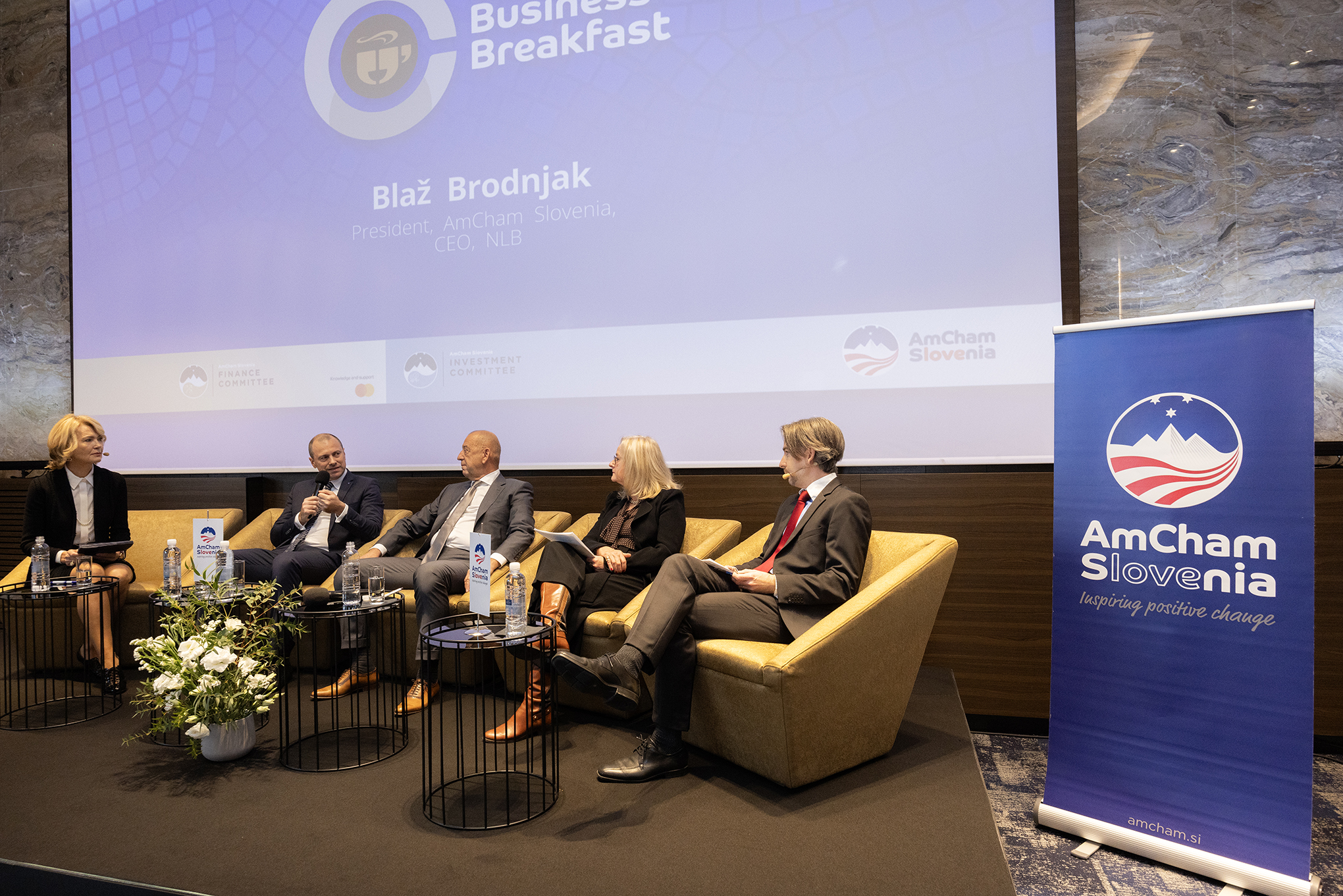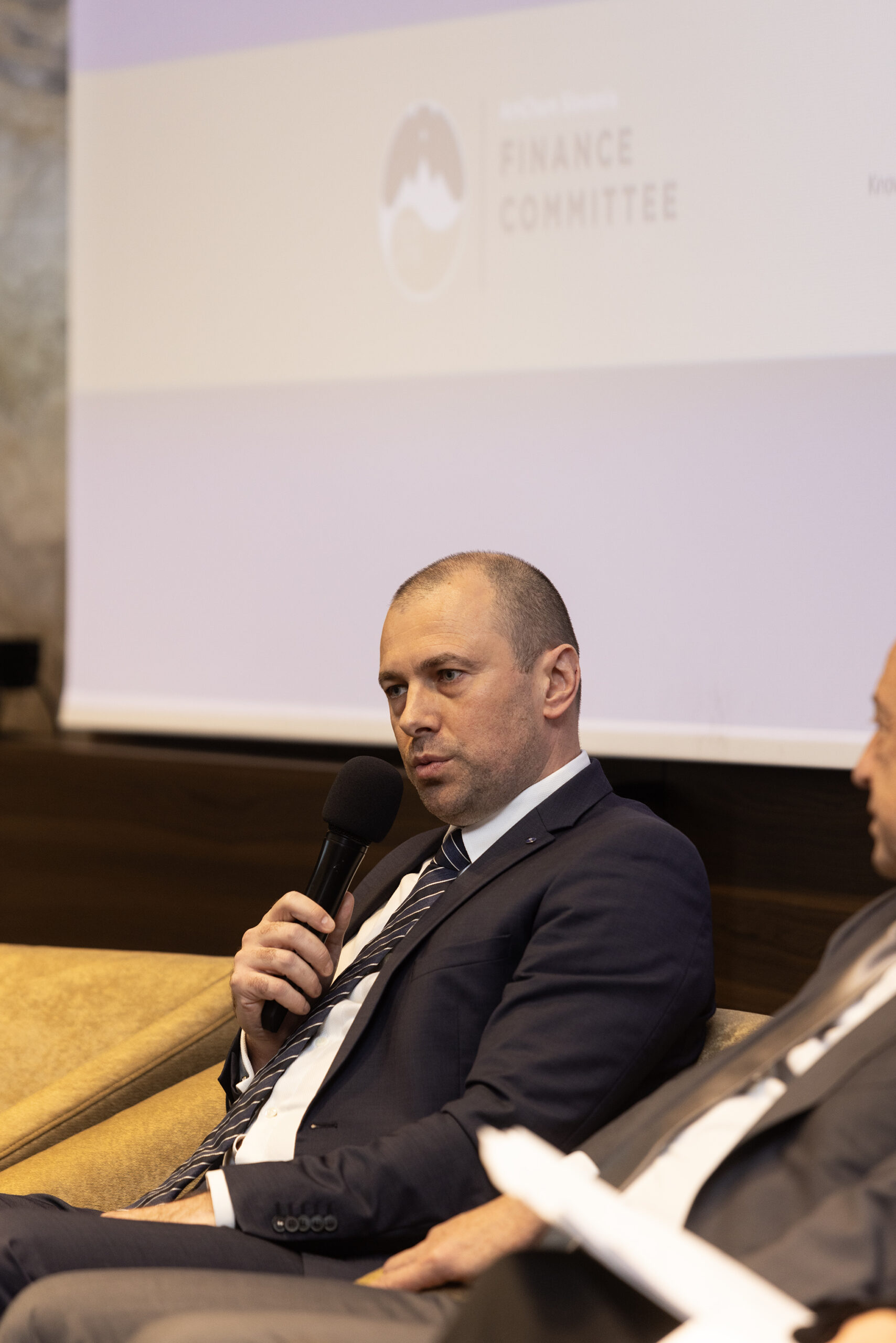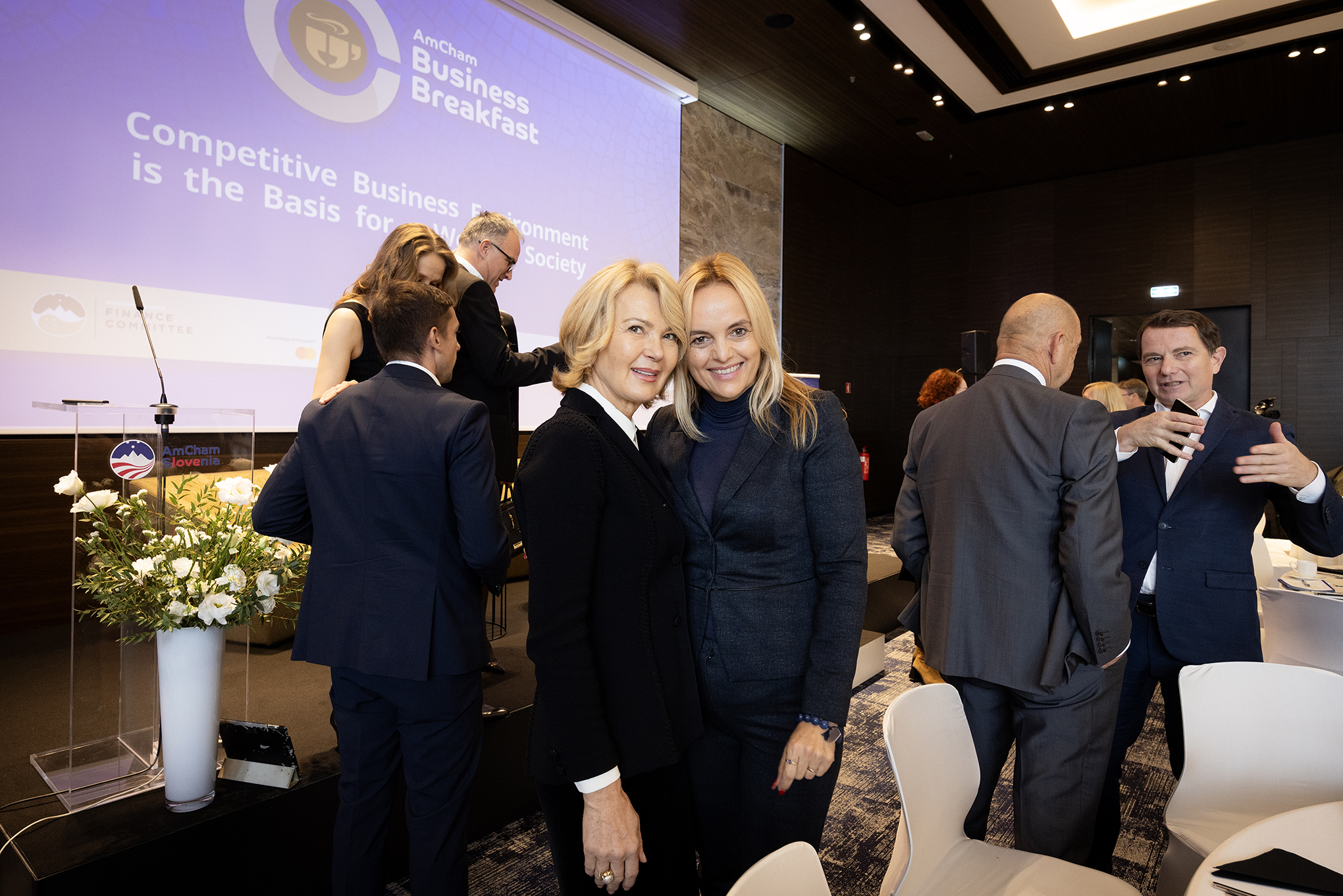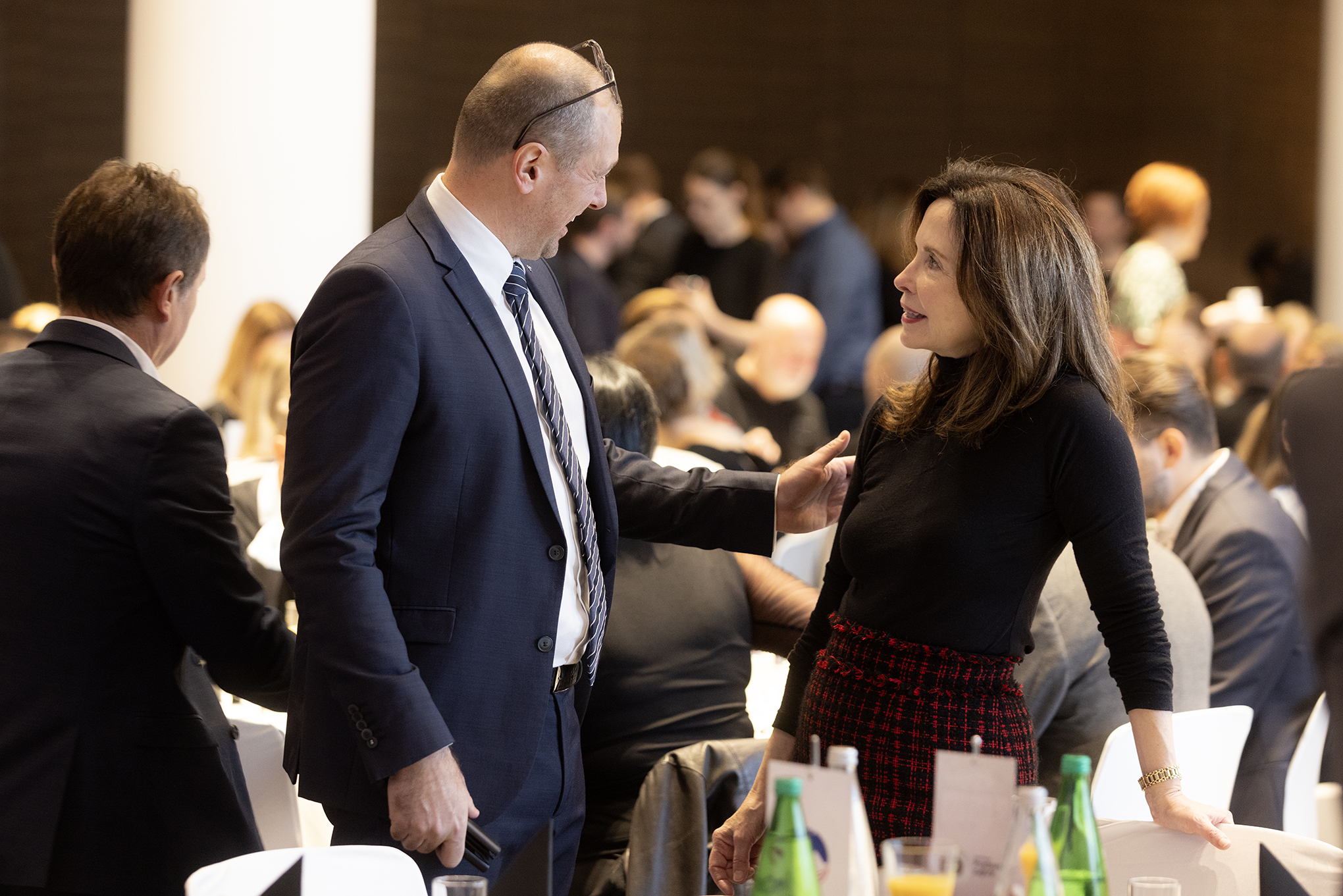AmCham Business Breakfast: Competitive Business Environment is the Basis for a Welfare Society
At the AmCham Business Breakfast titled “Competitive Business Environment is the Basis for a Welfare Society,” our guests Blaž Brodnjak, President, AmCham Slovenia, and CEO, NLB, Tibor Šimonka, President, Chamber of Commerce and Industry of Slovenia, and Dagmar von Bohnstein, President, German-Slovene Chamber of Commerce & the Industry (AHK Slowenien), agreed that with the necessary establishment of a more optimal tax environment, we must internalize a dynamic view, because only by doing so can we adopt a long-term perspective, which is crucial for the future of Slovenia. Reducing wage taxes to prevent human capital flight is paramount, and a competitive business environment brings about social well-being.
Marko Derča, Partner, Kearney, shared with us the results of the survey on the competitiveness of the Slovenian economy. We also presented the findings of the Report on Comparison of Employee’s Net Income in Selected CEE Countries, which KPMG prepared for the AmCham Finance Committee. Slovenia is among the top three countries when the level of Tax&SSC within the total employee cost is being compared among CEE countries.
The entire AmCham community advocates for a stable and predictable business environment, and over the last year, we have repeatedly highlighted the lack of dialogue with the government. Thus, Blaž Brodnjak, President, AmCham Slovenia, pointed out that Slovenia has the highest taxes and added: “Democracy has its deficiencies … My first call would be to change the election system. This is a serious challenge. These aren’t the people we have chosen. The country is run by someone who refuses to listen to 15 organizations?”
Tibor Šimonka agreed that when recession looms, an additional burden on the economy and ignoring the macroeconomic environment is unacceptable. As our economy is already among the highest-taxed in Europe, he compared such behavior with that of predatory states.
Dagmar von Bohnstein shared views of the German business community on the flood reconstruction and recovery. The business community has supported its employees, other companies, and local communities, and efforts have been made to rebuild the country as soon as possible. Hence, she highlighted: “Supportive can only be a successful company which is not burdened by taxes … Don’t treat the business as the opponent … Business increases the welfare of the country.”
Marko Derča, Kearney, presented the findings of the analysis titled Competitiveness of the European and Slovenian Economy. Compared to other reference countries, the Slovenian economy is still lagging behind in terms of competitiveness and GDP. Nevertheless, between 2017 and 2022, Slovenia recorded a GDP per capita growth of 2.4%, while the EU-27 averaged 1.3%. The overall strength of economies primarily depends on labor productivity. Innovation supports productivity, and innovation delays affect the strength of our economy. Marko Derča stressed that predictability of the regulatory environment and innovation are the most important factors for a thriving economy. However, we must be aware that rapid change and volatility are today’s global outlook. We can expect geopolitical turbulence, the increasing role of climate change, unstable inflation rates, and labor market imbalances.
Šimonka pointed out that Slovenia is an export-oriented economy, yet we have a more important role in only a few of the things we export. Our added value cannot increase without investment in research and development; it is high time that the country was genuinely aware of this. Slovenian Research Agency (ARIS) now plays a crucial role, but its number of employees has not increased, which, in his opinion, reflects recklessness. “Without business, there is no strong welfare state – the basic prerequisites are investment in research and development and an optimal tax environment.” He wishes that the remuneration of business performance to be linked to the salary of the employee, not the average salary in Slovenia; that a tax incentive be given to companies that are innovative and meet certain development criteria; and advocates for indexation of the income tax scale and the introduction of a real estate tax and different taxation of the real estate legal entities. He pointed out that nothing of the proposed tax reform has been met with understanding, let alone implemented. He concluded that he believed the treasury would be deprived of revenue in the first two years, but at the same time, he was convinced that such revenue would be higher after that period.
We also shared findings of a report comparing employee’s net income in Croatia, Hungary, the Czech Republic, Poland, Slovenia, Slovakia, and Serbia, including comparisons of net income at gross earnings of €25,000, €54,000, and €100,000, which KPMG developed for AmCham Slovenia. At €25,000 gross, the highest net gets the employee in the Czech Republic, with €18,500, and the lowest in Slovenia, €16,620. Even with a gross salary of €54,000, the most optimal ratio is in the Czech Republic, where the employee gets €39,960 on their account, and the worst in Slovenia, €32,510. In Serbia, employees receive a net salary of €80,000 out of €100,000 gross, ranking it first among the seven CEE countries included in the report. In contrast, in the case of the same gross earnings, employees in Slovenia only get €55,240. Slovenian employees are taxed the most and receive the lowest net payment compared to other countries included in the report.
Some main takeaways of the analysis were:
- In all three scenarios (€25,000, €54,000, and €100,000), the employee taking home the lowest net salary is from Slovenia.
- The best-positioned employee in all three scenarios is the employee from the Czech Republic, taking home the highest- or second-highest net income.
- Serbia and Slovakia are the other two highest-ranking countries on the net income chart.
- Slovenia is among the top three countries when the level of Tax&SSC within the total employee cost is being compared among the CEE countries.
- Serbia has the highest net income in the case of €100,000 (€80,000).
Speaking about decision-makers reluctance to address the challenges and burdens on wages in Slovenia and their consequences, Blaž Brodnjak said: “In this region, we have many opportunities. If the labor tax is lower, Slovenia may face a deficit for a while, but at the same time, we will attract foreign and retain domestic talent.” Due to static thinking, we lack a long-term, dynamic perspective, which is crucial for the country’s bright future.
Dagmar von Bohnstein stated: “Give your people an opportunity to deliver excellent performance. How can they be ambitious and achieve the best results without mutually beneficial cooperation? Invest in your people and encourage them. This will open up opportunities for the future.”
Blaž Brodnjak rounded off the event, saying that even a small step in the right direction is a good sign. “Slovenian population is entrepreneurial. The Olympic results tell everything about the spirit of this nation. Competitiveness is in our genes, but we must do something about the tax system. Capital is not evil but a leverage for growth. A bright future lies ahead; let’s set our goals and get started.”








